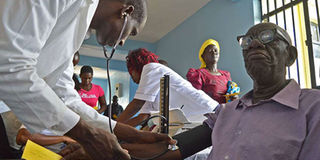Quality health a human right

Patients being attended to at Randburg Community Hospital in Nyando, Kisumu. The government has made bold strides towards achieving the envisaged universal health coverage. PHOTO | FILE | NATION MEDIA GROUP
What you need to know:
- Notably, the government has made concerted efforts towards providing the UHC, in compliance with the law.
- The National Hospital Insurance Fund (NHIF) will be reconfigured to, besides digitisation, extending services through 37,000 bank agents.
- Doctors are also performing IVF, helping women who had lost hope in having children.
The government has made bold strides towards achieving the envisaged universal health coverage (UHC), as is evident in the financial priorities pledged in its effort to combat HIV/Aids, TB and maternal health challenges.
The Universal Declaration of Human Rights recognises health as a right; hence, all have a right to proper healthcare. Equally, the Sustainable Development Goal No. 3 emphasises good health and well-being. Closer home, the Constitution, at Article 43(1)(a), declares that every Kenyan has a right to the highest attainable standards of health.
UHC
Notably, the government has made concerted efforts towards providing the UHC, in compliance with the law.
This is evident in the ‘Big Four’ agenda, where affordable health coverage is prioritised. Public health spending will be increased from Sh6 billion in 2018 to Sh73 billion in 2021, as the country goes from the current 36 percent coverage to achieve 100 percent UHC by 2022, when the population will be 50 million.
The National Hospital Insurance Fund (NHIF) will be reconfigured to, besides digitisation, extending services through 37,000 bank agents.
The Linda Mama (free maternity) programme will be rolled out to mission and other private hospitals and there will be CT scan capability in all counties.
However, several challenges bedevil these endeavours.
One is the doctor-to-patient ratio of 1: 16,000, which the importation of 100 Cuban medics goes some way in plugging.
Notable also is the welfare of doctors, where the government has yet to strike a consensus with the practitioners.
COMPLEMENT SKILLS
The importation of doctors complements the medical skills in the health sector and even introduces some more.
I believe in the adage “the more the merrier” — particularly for patients suffering without the means to make it to a referral hospital with a specialist, often in towns.
Nevertheless, the right to life is a non-derogable norm and the government, therefore, has to pull all stops to avert the deaths of citizens. The Hippocratic Oath that binds doctors also has a human rights tune.
To exorcise the ghosts of medical negligence in our hospitals, the government’s efforts ought to be embraced.
SURGERY MIX-UPS
A case in point is the recent surgery patients mix-up at the Kenyatta National Hospital and the Bungoma County Referral Hospital incident where a needle was left in a woman’s birth canal in a botched maternity operation.
For avoidance of doubt, this is not to downplay the commendable effort Kenyan medics make to save our lives.
A good turn deserves another. Just to mention a few, the feat of the doctors who reattached a man’s severed arm at the KNH, Nairobi, in February, is laudable.
Doctors are also performing IVF, helping women who had lost hope in having children.
Opinion is divided, but it is arguable that the health sector was on its deathbed some years back but is being resuscitated.
The revamped NHIF, Linda Mama, Beyond Zero clinics, importation of medical equipment and doctors and better terms and training for medical and other health personnel, are some of the triggers.
The core obligation of a government is to abide by the Constitution and provide affordable universal health coverage.
But the creation of an avenue for enjoyment of the right to health should not be for personal or political gain.
The essence is to save lives, prevent financial misery and, set the country on a healthier course. Health rights are inalienable entitlements to human beings.
Mr Ayuo is a legal researcher and tutor. [email protected]





